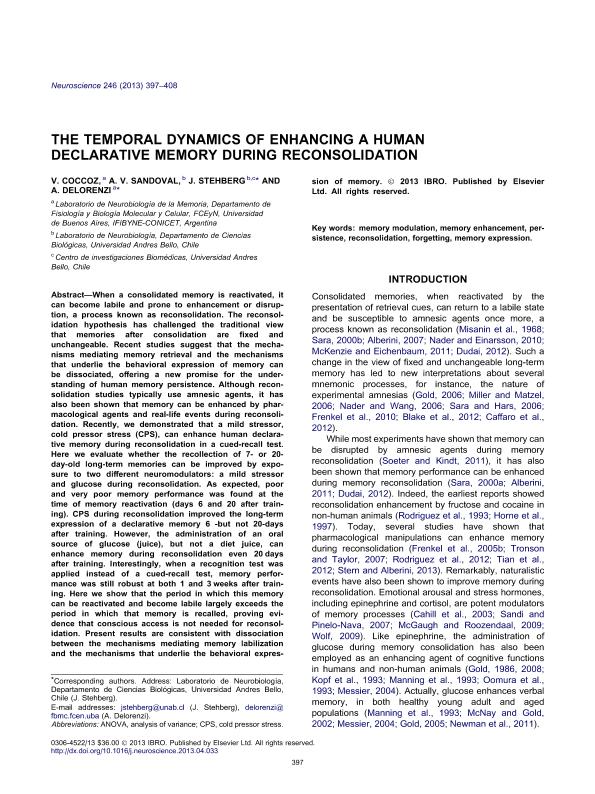Mostrar el registro sencillo del ítem
dc.contributor.author
Coccoz, Veronica

dc.contributor.author
Villalón Sandoval, Adolfo
dc.contributor.author
Stehberg, Jimmy
dc.contributor.author
Delorenzi, Alejandro

dc.date.available
2022-12-27T12:16:12Z
dc.date.issued
2013-08
dc.identifier.citation
Coccoz, Veronica; Villalón Sandoval, Adolfo; Stehberg, Jimmy; Delorenzi, Alejandro; The temporal dynamics of enhancing a human declarative memory during reconsolidation; Pergamon-Elsevier Science Ltd; Neuroscience; 246; 8-2013; 397-408
dc.identifier.issn
0306-4522
dc.identifier.uri
http://hdl.handle.net/11336/182462
dc.description.abstract
When a consolidated memory is reactivated, it can become labile and prone to enhancement or disruption, a process known as reconsolidation. The reconsolidation hypothesis has challenged the traditional view that memories after consolidation are fixed and unchangeable. Recent studies suggest that the mechanisms mediating memory retrieval and the mechanisms that underlie the behavioral expression of memory can be dissociated, offering a new promise for the understanding of human memory persistence. Although reconsolidation studies typically use amnesic agents, it has also been shown that memory can be enhanced by pharmacological agents and real-life events during reconsolidation. Recently, we demonstrated that a mild stressor, cold pressor stress (CPS), can enhance human declarative memory during reconsolidation in a cued-recall test. Here we evaluate whether the recollection of 7- or 20-day-old long-term memories can be improved by exposure to two different neuromodulators: a mild stressor and glucose during reconsolidation. As expected, poor and very poor memory performance was found at the time of memory reactivation (days 6 and 20 after training). CPS during reconsolidation improved the long-term expression of a declarative memory 6 -but not 20-days after training. However, the administration of an oral source of glucose (juice), but not a diet juice, can enhance memory during reconsolidation even 20. days after training. Interestingly, when a recognition test was applied instead of a cued-recall test, memory performance was still robust at both 1 and 3. weeks after training. Here we show that the period in which this memory can be reactivated and become labile largely exceeds the period in which that memory is recalled, proving evidence that conscious access is not needed for reconsolidation. Present results are consistent with dissociation between the mechanisms mediating memory labilization and the mechanisms that underlie the behavioral expression of memory.
dc.format
application/pdf
dc.language.iso
eng
dc.publisher
Pergamon-Elsevier Science Ltd

dc.rights
info:eu-repo/semantics/openAccess
dc.rights.uri
https://creativecommons.org/licenses/by-nc-sa/2.5/ar/
dc.subject
FORGETTING
dc.subject
MEMORY ENHANCEMENT
dc.subject
MEMORY EXPRESSION
dc.subject
MEMORY MODULATION
dc.subject
PERSISTENCE
dc.subject
RECONSOLIDATION
dc.subject.classification
Otras Ciencias Biológicas

dc.subject.classification
Ciencias Biológicas

dc.subject.classification
CIENCIAS NATURALES Y EXACTAS

dc.title
The temporal dynamics of enhancing a human declarative memory during reconsolidation
dc.type
info:eu-repo/semantics/article
dc.type
info:ar-repo/semantics/artículo
dc.type
info:eu-repo/semantics/publishedVersion
dc.date.updated
2022-12-22T16:06:19Z
dc.journal.volume
246
dc.journal.pagination
397-408
dc.journal.pais
Países Bajos

dc.journal.ciudad
Amsterdam
dc.description.fil
Fil: Coccoz, Veronica. Consejo Nacional de Investigaciones Científicas y Técnicas. Oficina de Coordinación Administrativa Ciudad Universitaria. Instituto de Fisiología, Biología Molecular y Neurociencias. Universidad de Buenos Aires. Facultad de Ciencias Exactas y Naturales. Instituto de Fisiología, Biología Molecular y Neurociencias; Argentina
dc.description.fil
Fil: Villalón Sandoval, Adolfo. Universidad Andrés Bello; Chile
dc.description.fil
Fil: Stehberg, Jimmy. Universidad Andrés Bello; Chile
dc.description.fil
Fil: Delorenzi, Alejandro. Consejo Nacional de Investigaciones Científicas y Técnicas. Oficina de Coordinación Administrativa Ciudad Universitaria. Instituto de Fisiología, Biología Molecular y Neurociencias. Universidad de Buenos Aires. Facultad de Ciencias Exactas y Naturales. Instituto de Fisiología, Biología Molecular y Neurociencias; Argentina
dc.journal.title
Neuroscience

dc.relation.alternativeid
info:eu-repo/semantics/altIdentifier/url/http://www.sciencedirect.com/science/article/pii/S0306452213003588
dc.relation.alternativeid
info:eu-repo/semantics/altIdentifier/doi/http://dx.doi.org/10.1016/j.neuroscience.2013.04.033
Archivos asociados
